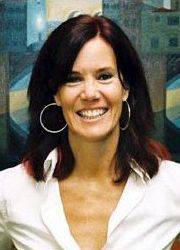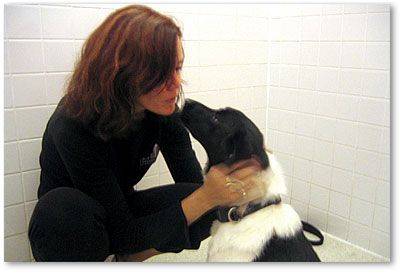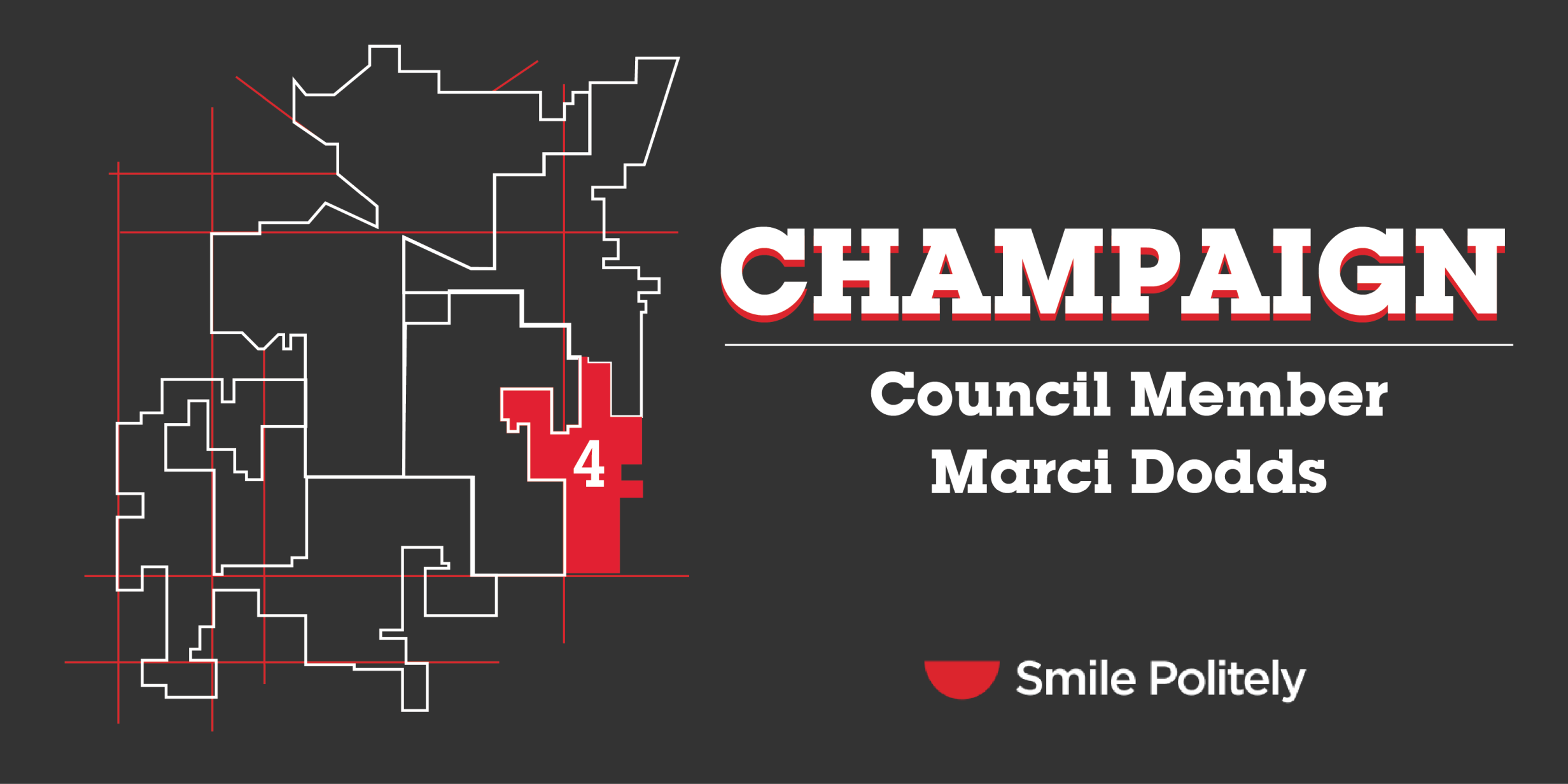Marci Dodds, the councilperson from Champaign’s District 4, which she calls the “heart of the city,” talked with me as part of Smile Politely’s ongoing series on local city officials.
Question 1.
Smile Politely: What are your connections to Champaign?
Dodds: I was born here, and my family has a long history here. My grandmother was both a Burnham and a Harris. So there were connections to the library, Burnham hospital, and First National Bank. She was really very much of Champaign. Both of her sons, my dad and my uncle, lived here. I moved to Chicago when I was 11, and then I was gone until 1990. I saw the USA the higher education way. I went to programs in schools around the country: Los Angeles, Boston, Houston.
Then I met my husband Cody, who was a musician at the time. We were living outside Manhattan. When we decided to have a kid, he decided he had to do something else; otherwise, he’d be gone all the time. So we decided to open a record store. That was in 1989. We sat in a library around an atlas — that was before there was internet, so you actually had to go to a library to look at places.
We narrowed it down to Eugene, OR, Columbus, OH, and here. And this place won out because the grandparents were here.
 Question 2.
Question 2.
SP: How did you get involved in city politics?
Dodds: I’ve always been interested in politics, but always as an observer. One day my next-door neighbor, who happened to be head of Democratic Party, knocked on my back door and told me the previous council member in District 4 had to leave his seat. He asked me to put my hat in the ring. My reaction was, “But my husband can’t… he does too much business with the city.” And she said, “Not your husband: you.” It had never occurred to me that I would be able to do this wonderful thing. So I applied and was appointed. That was in 2005.
Question 3.
SP: What’s your professional and educational background? And how does your professional background resonate with your time on city council?
Dodds: I’ve done a lot things — I attended graduate school for creative writing in Houston and then transferred to UCLA, where I studied screenwriting. I was a freelance music journalist for a while; I had to do research and learn how to ask good questions. That’s helped immeasurably during my time on council. I read everything, and if I don’t understand it or see the connection, I ask. Then I went back to school for nursing, and now I’m a nurse in the Wound Center at Carle Hospital.
Question 4.
SP: What issues have especially captivated you during your time on city council?
Dodds: I think every council member, past, present, and future, will say that they ended up becoming passionate about something they didn’t expect. And for me, it was storm water. Who knew I’d find storm water runoff fascinating? But I’ve come to do that a lot ever since we had terrible flooding after a hurricane. The devastation was so horrible it made it hard to travel on the streets. And it just so happened that I was interested in that.
Question 5.
SP: Can you say more about your involvement with storm water?
Dodds: During the time that extreme flooding was happening in Champaign, I worked with two neighborhood groups. Water from one neighborhood drained into what I call the “Healy Hole,” which previous councils built — it stopped the flooding in Campustown and changed the face of Campustown. That group was on John Street.
Working with John Street was an opportunity to loop together several things I’m interested in, including green practices. The neighborhood’s steering committee worked with the University of Illinois to build green houses and other things, and did permeable pavement so they could to see how that would work — to get a feel for whether or not it can hold up in Midwest winters. Permeable pavement was put in both sidewalks and an alley on a city street to see how it would do. And it’s done very well. We also were able to incorporate other green practices that allowed the water to be cleaned through the drainage process.
We worked as a whole city with the university and were able to put together a great plan that we have presented at conferences around the state. People were fascinated by this project and asked how we did this. The answer is it was done organically and with a lot of work — there’s no magic bullet.
And then there was West Washington Street, and that project was much more challenging for us. Their neighborhood didn’t have a steering committee, didn’t believe the government would help them, and felt ignored. And their flooding was in some ways worse than John Street’s. They had streets that fire trucks couldn’t get through because there was so much water. They had to change where they drain to and put in storm water utility fee. Their project is really just starting. They’re getting money for the project, for the design, and things like that. And more than that, they’re working with the city, and that’s great. I’m amazed at the time and commitment people from John Street and West Washington have put into these issues. It’s too easy to say that that they care just because it’s their homes. Many, many people are going to benefit from what they’re doing.
As a councilperson, I’m just there to make sure nothing gets lost, to make sure their work doesn’t go for naught.

Question 6.
SP: What other projects have you been passionate about during your time on council?
Dodds: I’ve been involved in bringing more art to downtown to Champaign, and I’m also extremely interested in the Summer Youth Employment Program, which helps young people find summer work.
I pushed for Friday Night Lights, though I certainly wouldn’t say I was a big force in that. We encouraged them to have more events downtown, and they came up with Friday Night Live.
Question 7.
SP: Since you’ve had involvement with the arts in so many different capacities, I’d be curious to know what in terms of the arts you think Champaign is still missing.
Dodds: We’re could use a certain type of venue — something between the size of Virginia Theatre and Assembly Hall. But I wouldn’t say we’re missing anything necessarily. We just need to keep developing. We are a micro-urban community, and I’d like to move us up to a small urban community. We have a vibrant, creative community — there’s a lot going on. We just need more of it. For instance, we have a really great library. I was involved in helping to develop that. And what I would like to have is something like that for the arts scene — more and better of what there already is.
Question 8.
SP: Has there been a time when you felt like most of your constituents held a view that was opposed to how you ended up voting on that issue?
Dodds: No. That’s not how I view my position, because my position is representational. So unless the view is morally repugnant, I need to vote in line with my constituents.
But I think many people weren’t happy when we decided to ground one of the fire engines because we couldn’t afford the overtime. But I told people the money has to come from somewhere — our only other option was to raise taxes or to have a miracle happen. And I think people in my district were pragmatic about that.
One other difficult decision had to do with banning public smoking. Ultimately it came down to whether you believed it was a public health issue or a rights issue. I began by thinking it was a rights issue, in part because I was a smoker for years, though I had long quit by that point. But then suddenly a light bulb went off, and I realized it was actually a public health issue. Everyone who voted in favor of the smoking ban was reviled, including me. There were signs around certain bars that said things like, “These council members hate you.” It was very intense.
Question 9.
SP: How would you characterize your district? And what do you think is the most pressing issue currently facing your district?
Dodds: District 4 is the core of the city; it’s the heart of the city. It’s the most active district, and it votes the most. It’s a very activist district, and it’s also very centrist. It tends to be a very pragmatic group of people and also very community-minded.
I think the most important issue for District 4 have to do with infrastructure. In the coming months, with the thaw, there will be a lot of issues with potholes, streets breaking, and flooding. We’ve got some streets in District 4 that are in really bad shape — you might think, I can’t walk down this, let alone drive down it.
And I do include the Hyatt in thinking about District 4 — that will be an important thing.
Question 10.
SP: How would you describe your political philosophy?
Dodds: It’s fairly straightforward — I’m very socially liberal, and also pretty pragmatic, and also centrist.
I also believe in government, and I believe it has a role in people’s lives. I’ve noticed that people who tend to say it doesn’t are the ones who tend to take government for granted. It’s brutally expensive to hire your own police officer. And I don’t want to start my own roads either, and I don’t want to open my own business that has no sidewalk in front of it. I want to have an overarching federal government to turn to because we’re not 50 individual fiefdoms. I want to be able to turn to somebody who will say it’s not okay to have a porn shop next to a school, or whether or not it’s okay to have restaurants in certain neighborhoods. I feel very strongly that government has a real and vital role. I don’t see all regulations as bad. But no regulation is all good, either.
I don’t see government as existing out there. And I make this point all the time on council. If you live in the city, you are the city. When you walk, you drive, you jump up and down, you are the city. I don’t buy this idea that government is this other thing that’s out there.
Question 11.
SP: Who are your political heroes?
Dodds: If I’m going to stick with elected officials, and stick with America, it would be Barbara Jordan, Tip O’Neill, Sam Ervin, and Ann Richards. They were all smart, outspoken, and didn’t take shit from anybody. And they knew what they were doing.
Question 12.
SP: If you had to vote to have something cut from the Champaign City Budget, what would it be?
Dodds: At this point, we’ve cut so much that there’s very little we have let to cut. There’s just no fat left. For the last six years, the city has done nothing but continue to cut. We did such a good job at the beginning that no one really felt them, but now, there’s nothing more that we can really cut.
Question 13.
SP: What are your views on same-sex marriage?
Dodds: My view is: hooray! What took so long?
Question 14.
SP: What about concealed carry?
Dodds: I am a believer in gun control. We don’t let people drive without a license because cars can kill people, and requiring you have a license is not a horrible thing. I definitely think guns need to be regulated.
Question 15.
SP: What spaces in Champaign do you enjoy?
Dodds: I really enjoy downtown Champaign. I like our parks, especially Westside. And obviously the library.








